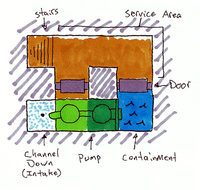- v50 information can now be added to pages in the main namespace. v0.47 information can still be found in the DF2014 namespace. See here for more details on the new versioning policy.
- Use this page to report any issues related to the migration.
Moat
| This article was migrated from DF2014:Moat and may be inaccurate for the current version of DF (v50.14). See this page for more information. |
| Part of a number of articles on |
| Projects |
|---|
| Basic |
| Aqueduct • Archery tower • Atom smasher • Danger room • Dam • Garbage dump • Mass pit • Moat • Pit trap • Reservoir• Sally port • Swimming pool • Tower • Tree farm |
| Advanced |
| Drowning chamber • Magma piston • Obsidian farm • Pump stack • Silk farm • Water reactor |
v50.14 · v0.47.05 This article is about the current version of DF.Note that some content may still need to be updated. |
A moat is a very simple and universally applicable piece of defense design, and often the first defense-oriented piece of engineering that players will embark upon. A basic moat is nothing more than a dug-out trench encircling your entrance with a single three-tile wide (for caravans) bridge over it attached to a lever. In the event of an attack, the lever can be pulled and the bridge raised, and whatever is threatening you will no longer have a direct entrance into your fortress.
There are two ways to construct a moat. The first is to dig out the moat level and then channel down to it from the above. The second is to channel down to that level first and then remove all ramps. In both cases it is necessary to have either a ramp leading out of the moat or a sealed-off access tunnel, to avoid stranding your miners. If you absolutely must have an absolutely clean moat, the effect can be achieved by building a support, attaching a floor to it above the ramp in question, linking it to a lever, and then collapsing the support. The floor will fall down and obliterate the ramp.
It's not necessary, but highly dwarfy, to fill a moat with water or magma. Although a dry moat is perfectly functional, doing so will render it more lethal to enemies that slip in by accident, especially if something waits for them down below. This is a double-edged sword, however; you should make sure there are no dwarves standing on bridges when you pull levers, and have your military engage the enemy far from your moat.
It should be noted that water-filled moats can be easily crossed by natural swimmers such as amphibians and/or non-breathing creatures; this is ground for a hilarious bugBug:926 causing giant toads to drown the elite goblins riding them as they path through your defences during a siege. Likewise, magma-filled moats will be ineffective against fire-immune creatures who don't need to breathe, although such types of creatures are admittedly much rarer - dragons are immune to magma's temperature but will drown in it. Also note that if you fill the moat with water in a climate that freezes during winter, the moat will become ineffective while the water in it has turned into ice. A two tile deep moat with only the bottom tile filled with liquid marries the effectiveness of an unfilled moat with the dwarfiness of a liquid-filled moat.
A moat by itself offers no defense against ranged enemies and will tend to scatter your animals and dwarves when they go outside and see lurking enemies. You can surround your moat with internal fortifications, giving you an advantage in ranged combat, but this will still spook dwarves. The best solution is a wall on one layer, with a set of stairs up to the next z-level with a fortified wall and walkway to give your marksdwarves someplace to shoot from. The other problem is that fliers will calmly hop right over your moat and curtain wall, so the one foolproof entrance is one floored from above.
